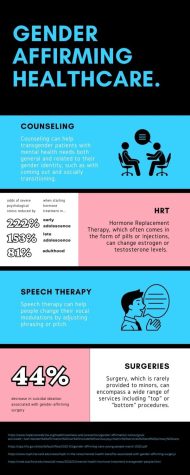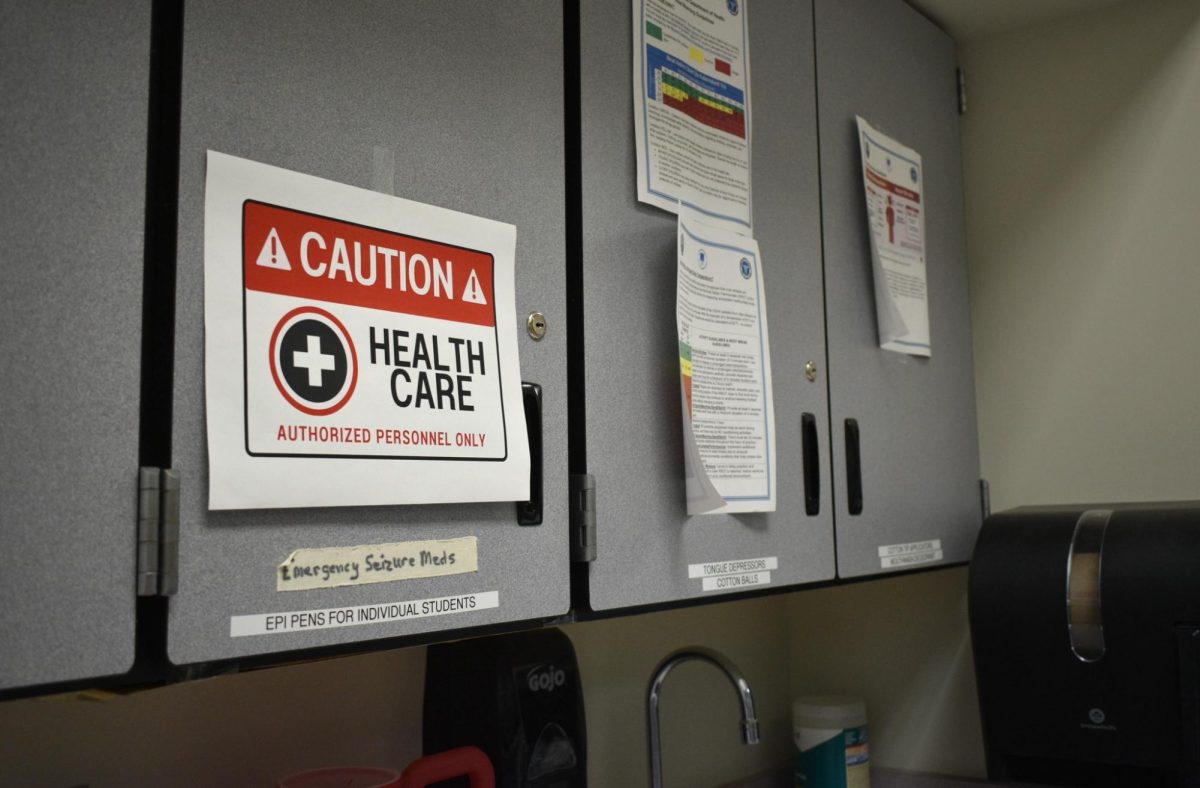Living one’s truth is a fundamental right, but for many transgender youths in our community, this prerogative is becoming a privilege. Stigma, unsupportive families and hate crimes are already significant problems for such adolescents. Now, with the blatant denial of gender-affirming care, even official legislation is targeting them.
Offering gender-affirming healthcare to transgender patients is not a new phenomenon. In fact, more than 100 years ago, German physician Magnus Hirschfeld was the first to offer his patients the means to live according to their gender through methods like hormone treatments and surgical procedures, methods that are even used today. Soon after, however, this momentary freedom for transgender self-expression was taken away by Nazi Germany’s anti-trans bills. Recently, an eerily similar turn of events is threatening the youth of present-day America.
Under the guise of “protecting our children,” this dehumanizing wave of laws ban transgender minors from receiving necessary gender-affirming care, barring them from expressing themselves and, ironically, putting them in greater danger.

The surge in anti-trans legislation began in 2021 with Arkansas signing the Save Adolescents from Experimentation (SAFE) Act, which bans minors from accessing all gender-affirming treatments, including counseling, speech therapy, hormone replacement treatments (HRT) and — less frequently performed — surgeries. The SAFE Act suggests that those “struggling” with identifying as their biological sex should “seek mental health services” to address their “distress” instead of receiving gender-affirming care.
However, these treatments are especially important for transgender youths, given 36% of transitioning youths opt for gender-affirming care while still teenagers. This accounts for more than 54,000 transgender minors aged 13 through 17 who risk losing access to important treatments. Among these statistics used to be now-18-year-old Rainier Neuwirth-Deutsch, who identifies as transmasculine and is currently on HRT. Neuwirth-Deutsch is taking testosterone injections to lower his voice and plans to get top surgery this summer.
“HRT has lowered my gender dysphoria a lot and made me feel comfortable with my body. A lot of people assume we are confused, [that] this is just a ‘trend,’ and we do not know what we are doing,” Neuwirth-Deutsch said. “But I have felt more confused and distressed in a feminine body than a masculine body. I felt more ‘me’ after coming out and getting the right treatments.”
The 2022-2023 legislative year now brings 27 states that have followed Arkansas’ steps in introducing bills restricting similar healthcare measures through civil fines, medical license revocations and criminal penalties. In fact, Kansas, Tennessee, Iowa, Oklahoma and Kentucky — states that border Missouri — have all signed anti-trans bills, many of which have been passed as law. Presently, Missouri bill HB 2210 — which has not yet been signed into law — targets gender-affirming care providers and criminalizes parents who support their children in getting such care. This bill is particularly egregious because it not only deprives transgender individuals of essential healthcare but also obstructs their family members from creating safe spaces for their transgender children.
“It hurts to see so much hate and discrimination being made legal, and it is narrowing in on Missouri. We are a red state, so it will be unsurprising if our legislation right now makes such changes and passes similar laws,” Neuwirth-Deutsch said.
In Missouri, the unnecessary assault on institutions that provide necessary healthcare for transgender youths is already underway. Recently Jamie Reed, a former case manager for the Washington University Transgender Center at St. Louis Children’s Hospital, ignorantly accused the center of neglecting children’s mental health issues and focusing only on treating gender dysphoria with hormones and other physical treatments. Reed lacks qualifications to discuss gender-affirming care — care that medical research has proven to be crucial for the well-being of transgender youths. Accordingly, her “testimonials” as an intake worker are personal accounts that should be treated as opinions rather than facts.
However, despite Reed’s claims remaining unsupported, her words have had a resounding impact on legislation and an onslaught of state and federal investigations of the major transgender centers that accommodate minors in Missouri. These misleading accusations have put transgender youth at an even higher risk of losing gender-affirming care amid an anti-trans wave. Senior Quinn Gilles receives HRT from the Transgender Center through weekly testosterone injection shots that he administers at home.
“I personally did not relate to any of the things Reed claims in her article. The doctors and staff are nice and very informative,” Gilles said. “My parents and I were made aware of all of the side effects of hormone therapy, and it was my choice; [it was] definitely not forced in any way. [The staff] made sure that we knew everything that we needed to know, and the center had all the resources a transgender youth wishes they could have, especially in a conservative state like Missouri.”
Like Reed’s assertions, the aforementioned laws deny transgender minors access to healthcare treatments that abate their gender dysphoria, prioritizing “mental health” over safe and medically appropriate physical treatments. However, this approach is counterproductive and hurtful for teens, as gender dysphoria often leads to severe mental health disorders, including depression, drug addiction, self-injury and suicidal behavior.
Despite lawmakers claiming to prioritize adolescent mental health by making it a “focus” and “priority,” their bills are exacerbating the mental health of affected individuals. It is imperative that we do not allow lawmakers to continue pushing this false narrative onto the general public. Transgender youths’ mental health is not up for casual debate; it is, quite literally, life or death.
“With HRT, it’s a night and day difference. I am significantly happier. My dysphoria is so much better. It is not fixed, but it is much better,” Gilles said. “It’s terrifying that kids won’t be able to access such important healthcare services. It’s like if you were super depressed and it was illegal to see a therapist; it is absolutely terrifying that laws will directly harm the younger people I love and care about” .”
In fact, in a recent study by the Journal of Adolescent Health, gender-affirming care was found to reduce depression and suicidal ideations in gender-diverse children and adolescents. Thus, policy focusing on restricting puberty blockers — which are reversible — and HRT — which is also partially reversible — do more harm than good. Considering 82% of transgender youth have considered suicide, it is vital that United States’ policies not only provide but also ensure a safe and affirming healthcare environment.
However, instead of protecting our youth, the recent surge in anti-trans policy has focused on preventing minors from expressing themselves appropriately. Acting as a barrage on freedom, this is a fundamental renouncement against the foundation of values America is built upon: freedom and individuality. More importantly, these laws pose a direct risk to the mental health of our peers by amplifying gender dysphoria in an already ostracizing world.
While our laws no longer guarantee that professional spaces like hospitals, schools and care centers accept and respect how transgender individuals identify, our community must work towards being more inclusive and caring of transgender peers and LGBTQ individuals who are already facing systemic hatred at a legislative level. Students, teachers and parents should be mindful of microaggressions and use people’s correct pronouns. To gain a deeper insight into the experiences of their peers, students can conduct independent research regarding the LGBTQ community to lower the stigma transgender people face daily. Meanwhile, the school administration must work towards eliminating hate speech in schools to create a safe, welcoming space for all students.
Yet, fostering a safe environment alone is insufficient; policy reform is absolutely necessary. The most important and surprisingly straightforward action we can take is to keep our LGBTQ community at the forefront of discussions surrounding them. This means actively seeking out and incorporating the voices and perspectives of LGBTQ individuals and organizations in decision-making and marching and campaigning for policies that promote their rights and well-being. Students should communicate with eligible voters about the significance of gender-affirming care for transgender minors. People of all ages, especially politicians, should seek education on gender, pronouns and sexuality.
Although changing legislation may seem daunting for those less involved in politics, even small efforts to improve the treatment of oppressed communities can make a difference and ensure that politicians treat our transgender peers respectfully. Furthermore, we must force these lawmakers to acknowledge and take responsibility for the lives lost by continuing to approve these laws.
How can we justify denying certain groups access to essential healthcare or basic self-expression rights when others their age can express themselves freely? The right to live authentically is a fundamental human right. It is crucial that transgender youth have access to medical healthcare without restrictions. Ensuring healthcare is not prohibited for transgender youth is of utmost importance. This issue calls for urgent action, or we risk losing our fellow students, peers and friends to largely-preventable systemic oppression.


![Missouri residents gather to protest the signing of an anti-trans bill proposed by the Republican Senate. The proposed bill would ban transgender girls from participating in youth sports on girls teams. “At least in the past, laws have only tried to prevent transgender [students] from participating in certain activities, which is already scary,” senior Quinn Gilles said. “Transgender minors barely have any rights, [but] when you thought it couldn’t get worse, now laws are preventing us from being ourselves.”](https://pwestpathfinder.com/wp-content/uploads/2023/03/FeaturedPhto-900x600.webp)
![Leaning on the podium, superintendent Melissa Schneider speaks to Parkway journalism students during a press conference. Schneider joined Parkway in July after working in the Thompson School District in Colorado. “My plan [to bond with students] is to get things on my calendar as much as possible. For example, being in [classes] is very special to me. I am trying to be opportunistic [meeting] kids [and] being in [the school] buildings. I have all the sports schedules and the fine arts schedules on my calendar, so that when I'm available, I can get to them,” Schneider said.](https://pwestpathfinder.com/wp-content/uploads/2025/09/IMG_5425-1200x943.jpeg)


![Red, white and blue, the American flag holds the values of our democracy. The fight that we once endured has returned, as student journalists and senior correspondents across the country are losing their voices due to government control. “[Are] the White House and [the] government limiting free speech [and] freedom of the press? Yes [they are],” chief communications officer of the Parkway School District and former journalist Elisa Tomich said.](https://pwestpathfinder.com/wp-content/uploads/2025/03/Untitled-design-14.jpg)
![A board in the Parkway West counseling department displays pennants of selective universities. With a wide range of students interested in attending, it’s important that these schools have clear priorities when deciding who to admit. “[Washington University] had the major that I wanted, psychology, philosophy, neuroscience. That's a holistic study of the brain, and [WashU is] the only college in the world that offers that. That's the main reason I wanted to go; I got into that program,” senior Dima Layth said.](https://pwestpathfinder.com/wp-content/uploads/2025/02/Flag-1.png)

![Within the U.S., the busiest shopping period of the year is Cyber Week, the time from Thanksgiving through Black Friday and Cyber Monday. This year, shoppers spent $13.3 billion on Cyber Monday, which is a 7.3% year-over-year increase from 2023. “When I was younger, I would always be out with my mom getting Christmas gifts or just shopping in general. Now, as she has gotten older, I've noticed [that almost] every day, I'll open the front door and there's three packages that my mom has ordered. Part of that is she just doesn't always have the time to go to a store for 30 minutes to an hour, but the other part is when she gets bored, she has easy access to [shopping],” junior Grace Garetson said.](https://pwestpathfinder.com/wp-content/uploads/2024/12/DSC_0249.JPG-1200x801.jpg)

![Senior Sally Peters stands in the history hallway, contemplating her choices in the 2024 United States and Missouri elections on Nov. 5. As a member of Diplomacy Club, Peters has discussed key candidates and issues in contemporary American politics. “[As students], we're starting to become adults. We're realizing how much the policies that are enforced and the laws that make it through the House and Senate are starting to affect us. [Opportunities such as] AP [U.S.Government] and Diplomacy Club [make elections feel] a lot more real,” Diplomacy Club vice president and senior Nidhisha Pejathaya said.](https://pwestpathfinder.com/wp-content/uploads/2024/10/Flag-1-1.png)
![Mounting school pressure can leave many students overworked and overstressed. Schools must give students the necessary resources to help assuage student mental health issues and prevent the development of serious crises. “The biggest thing [schools] can do [to protect student mental health] is offer more time [to do work], like a study hall, or offer more support from teachers so that students don't feel stressed out and can get help in areas that they need,” senior Bhavya Gupta said.](https://pwestpathfinder.com/wp-content/uploads/2024/09/unnamed-4.jpg)
![After a thrilling point, senior Katie Byergo and junior Elle Lanferseick high-five each other on Oct. 8. With teamwork and camaraderie, Byergo worked together in the game against Lafayette High School. “[Byergo’s] is really positive with a good spirit,” Lanferseick said. “I set her [the ball] and she hits it [or] gets the kill.”](https://pwestpathfinder.com/wp-content/uploads/2025/10/DSC_9349-1-e1761159125735-1200x791.jpg)
![Focused on providing exceptional service, sophomore Darsh Mahapatra carefully cleans the door of a customer’s car. Mahapatra has always believed his customers deserve nothing less than the best. “[If] they’re trusting us with their car and our service, then I am convinced that they deserve our 100 percent effort and beyond,” Mahapatra said.](https://pwestpathfinder.com/wp-content/uploads/2025/10/DSC_0018-1200x800.jpg)
![Sophomore Aleix Pi de Cabanyes Navarro (left) finishes up a soccer game while junior Ava Muench (right) warms up for cross country practice. The two came to Parkway West High School as exchange students for the 2025-2026 school year. “The goal for the [exchange] program is to provide opportunities for both Parkway students and our international exchange students to learn about other cultures, build connections and become confident, capable, curious and caring — Parkway’s Four C’s — in the process,” Exchange Program Lead Lauren Farrelly said.](https://pwestpathfinder.com/wp-content/uploads/2025/10/Feature-Photo-1200x800.png)
![Gazing across the stage, sophomore Alexis Monteleone performs in the school theater. The Monteleone family’s band “Monte and the Machine” has been releasing music since 2012, but Alexis started her own solo career in 2024 with the release of her first single, Crying Skies. “My whole family is very musical, [and I especially] love writing [songs with them],” Monteleone said.](https://pwestpathfinder.com/wp-content/uploads/2025/09/DSC7463-1200x798.jpg)

![Leaping through the air, senior Tyler Watts celebrates his first goal of the season, which put the Longhorns up 1-0 against the Lafayette Lancers. Watts decided to play soccer for West for his last year of high school and secured a spot on the varsity roster. “[Playing soccer for West] is something I had always dreamed of, but hadn’t really had a good opportunity to do until now. It’s [really] fun being out [on the field], and I’m glad I decided to join the team. It’s just all about having fun with the boys and enjoying what time we have left together,” Watts said.](https://pwestpathfinder.com/wp-content/uploads/2025/09/DSC_1951-1200x855.jpg)
![Shifting global trade, President Donald Trump’s tariffs are raising concerns about economic stability for the U.S. and other countries alike. “[The tariffs are] going to pose a distinct challenge to the U.S. economy and a challenge to the global economy on the whole because it's going to greatly upset who trades with who and where resources and products are going to come from,” social studies teacher Melvin Trotier said.](https://pwestpathfinder.com/wp-content/uploads/2025/05/MDB_3456-1200x800.jpg)

![Pitching the ball on Apr. 14, senior Henry Wild and his team play against Belleville East. Wild was named scholar athlete of the year by St. Louis Post-Dispatch after maintaining a high cumulative GPA and staying involved with athletics for all of high school. “It’s an amazing honor. I feel very blessed to have the opportunity to represent my school [and] what [it] stands for,” Wild said.](https://pwestpathfinder.com/wp-content/uploads/2025/05/unnamed-6-1200x714.jpg)
![Freezing in their position, the Addams Family cast hits the “rigor mortis” pose after cast member and senior Jack Mullen, in character as Gomez Addams, calls out the stiff death move. For the past four months, the combined company of cast members, orchestra pit, crew and directors all worked to create the familial chemistry of the show. “I’m excited for [the audience] to see the numbers, the music, the scenes, but I also just love all the technical aspects of it. The whole spectacle, the costumes, makeup and the people that put in the work backstage in order to make the show successful on stage. I’m excited for people to see and appreciate that,” Mullen said.](https://pwestpathfinder.com/wp-content/uploads/2025/03/DSC0116-1200x800.jpg)